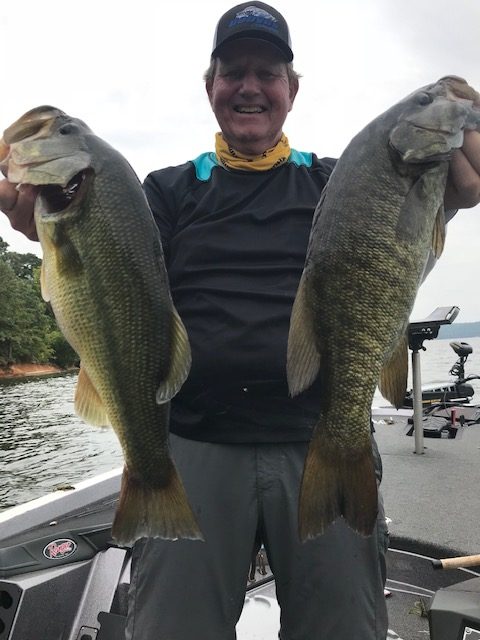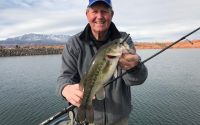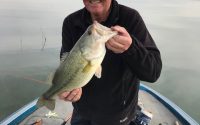Alabama, Here I Come!
A 5 lb largemouth and 4 lb smallmouth caught on Pickwick Lake.
This week’s column comes to you from the Shoals Marriott Resort in Florence, Alabama. Earlier this year, I earned a slot in the B.A.S.S. Nationals, a bass fishing tournament held (in 2018) on Pickwick Lake in Alabama.
Well, I say “Alabama,” but the lake actually runs into Mississippi (I’ve always wanted to use Mississippi in a sentence) and Tennessee. It occurred to me that many of you may have never heard of Pickwick Lake and might be interested to know a little about its history and my own impressions as I practice for this week’s tournament.
Pickwick Lake History
Pickwick Lake is the second “main river” reservoir and dam built on the Tennessee River. It was (and is) a multipurpose reservoir. Built between 1933 and 1940, it produces hydroelectric power through the Tennessee Valley Authority (TVA), provides close to 500,000 acre/feet of flood storage capacity, and covers part of the treacherous “Muscle Shoals” a series of rocky shoals that inhibited navigation on the Tennessee River.
As did many of the building projects in the heart of the Great Depression, the creation of the reservoir provided much needed construction jobs and industrial jobs that came with increased barge traffic along the Tennessee River. At least two towns were abandoned and now rest on the bottom of the sprawling reservoir.
Now, a robust barge transporting industry with all its components line the shoreline. Tank farms, grain storage, and countless other businesses service the region. Yet, because of the dense forest that surrounds the reservoir, most of the industrial complex isn’t visible to passersby. You must “try” to find the reservoir.
Pickwick Lake Fishery
As a fishery, Pickwick is known for huge catfish, largemouth and smallmouth bass. Large and smallmouth bass can grow to 10 pounds and more. Pickwick is a very fertile impoundment. To give you a comparison, Lake Powell (although a great reservoir in its own right) is not known to be a fertile reservoir. “Fertility” as I define it references the relative productivity of grass, fish habitat and the overall health of the fishery. If you were to catch a largemouth bass on Lake Powell and remove it from its home near a large boulder, for example, it might take a few months for another bass to take its place.
In Pickwick Lake, if you were to remove a bass from a similar location, it might be replaced by another eager bass within just a few minutes. Bait fish are abundant, layers of bass inhabit the reservoir. It is not uncommon to find schools of bass in the hundreds. Anglers sometimes catch 50 or more bass from a single school.
Although Lake Powell boasts huge striper schools (which can be massive) there is always a fight to provide enough forage so that the schools don’t starve to death. Stripers waste away, over populate, and struggle to thrive. There are no such problems at Pickwick. In cove after cove this week, I have seen schools of threadfin shad that seem never ending. And, it is that same in every cove or bay in the lake.
The B.A.S.S. National
The B.A.S.S. Nationals begins on Thursday and runs through Saturday of this week. Each of us will try to catch five bass per day and are able to “cull” smaller fish to end up with the five largest bass (15 inches long minimum) we can catch in an eight-hour time period each day. We keep the bass in live wells and they are released back into the reservoir after they are measure and weighed.
I am trying to become accustomed to new water, new habitat, and new challenges in navigation. And, that says nothing about learning to catch bass. I struggled the first day and didn’t catch a single “keeper”. However, I followed up the next day and caught close to 15 pounds on 5 fish.
Who knows how I will contend with 60 of the best anglers in the country, but for now, I am enjoying my sweet time in Alabama.











